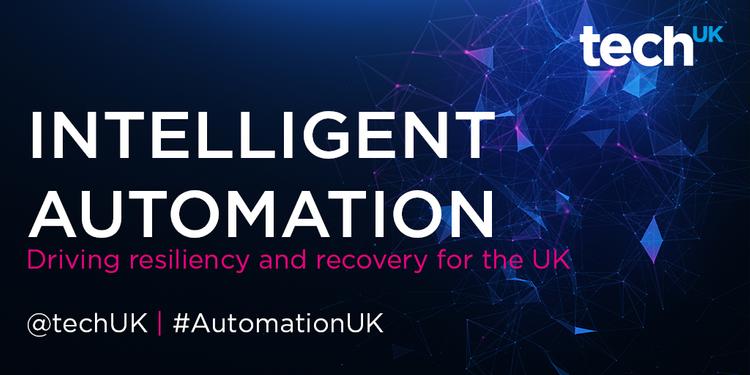Event Roundup: Intelligent Automation in Central Government

techUK would like to thank Julia Beresford, Deputy Director Policy, Strategy and Planning at Cabinet Office, Katie Rhodes, Senior Policy and Strategy Advisor, Cabinet Office, and Ian McGregor, Vice President Automation Sales, UiPath for sharing their insight during the session, which led to a useful and lively open discussion.
Key points from the Roundtable discussion
What does Intelligent Automation mean for the UK’s Government?
techUK defines IA as the amalgamation of evolving, high-potential technologies such as Machine Learning (ML), Robotic Process Automation (RPA) and end-to-end Business Process Optimization (BPO) platforms. Prior to COVID-19, IA was highlighted as a tool to enhance productivity, but the pandemic has underlined the crucial role of technology to adapt to the unprecedented. Indeed, IA is helping to mitigate disruption across the workforce and helping organisations become more resilient to external threats.
As pioneers and adopters of IA, the technology sector is an important example of how IA enables impactful, positive change to the UK’s workforce and economy. And, as a result of COVID-19, lots of companies are offering Automation tools that Government can benefit from.
In his opening presentation, Ian McGregor identified three key challenges facing UK Government for the adoption of Intelligent Automation:
- COVID-19 and workforce changes: The move towards remote working will have a long-term effect on the way many Government Departments will operate, with a move towards hybrid working expected across many industries and sectors. However, there are genuine concerns about employee wellbeing and employee productivity – with one WEF report saying that COVID is a huge driver in isolation from colleagues, and 78% of Business leaders reported that remote working will be detrimental to productivity. IA can help revolutionise the workforce by reducing the human input needed for monotonous tasks, and prioritising workflows so time is spent more efficiently.
- Legacy IT: Most digital transformation across Government has the challenge of integrating into the expansive network of legacy infrastructure. IA can help to exploit legacy IT, clearing backlogs and helping the infrastructure adapt to new challenges.
- Change: The COVID-19 pandemic has emphasised the necessity of Intelligent Automation for business agility. IA technologies can help process and systems navigate change. It can also ensure systems are in place to help with the need to train and retrain employees across the civil service.
Current Government Approach to Intelligent Automation
Julia Beresford offered a detailed overview of Intelligent Automation adoption across Central Government. The Automation work in Cabinet Office aims to support Government departments in their Automation journey and align Automation with a wider Government push towards digital adoption.
Julia explained the strategies in place that are helping Cabinet Office develop a more cohesive and strategic approach to Automation, including; an Automation Marketplace which provides buyers with resources and training, and procurement guidance; an Automation Register to bring all automation projects across Government together in one place, measure cross-Government success and share best practice; and the upcoming Consolidated Government Automation Blueprint which outlines the current landscape of Intelligent Automation and Government’s intent going forward.
It’s clear that the understanding of automation across the departments varies across Government Departments, but the consolidated efforts by Cabinet Office hope to build a strategic, cohesive and robust approach to adoption and deployment of IA technologies. At the moment, individual ambitious transformation agendas are taking time to deliver and more benefit can be realised through a cohesive tactical approach to delivery.
It was also recognised that there’s a need for a cultural shift to help embed Automation across Government Departments, and Cabinet Office needs to ensure that people and processes are aligned to get this right. As such, Cabinet Office is also collaborating with the Modernisation and Reform Programme in Cabinet to help drive this forward.
Automation Ethics
Katie Rhodes delivered an overview of the Automation Ethics Framework Cabinet Office has produced to provide civil servants with easy-to-understand guidance on ethical adoption of IA technologies. While this is internal guidance, it’s also recommended to third parties interacting with Government to help promote ethical practice in procurement. This document will help translate often complex ethical discussions into public sector delivery context.
Scaling Intelligent Automation in Government
Julia posed two key questions to industry that would help Cabinet Office to understand how to get Automation right – What are the blockers stopping Automation at pace? How do we measure success of Automation deployment? – prompting the following discussion points:
- Cabinet Office will need to incentivise scaling opportunities for IA and help Departments move away from inherent risk aversion when it comes to investing in tech. Efficiency data will be key here: it’s the Automation Taskforce’s responsibility to showcase those efficiencies to enable other Departments to invest in automation.
- The implementation approach of start small – implement – improve – educate – scale was broadly supported.
- Education is key to successful delivery at scale – fear of the unknown can often impact automation projects; and suppliers can help by providing the information to help educate and keep the momentum going.
- Previous pilots haven’t really gone anywhere so the Taskforce will have to be more focused and prioritised in its approach, ensuring that when something is proven to be successful, the use cases are collected, documented and shared.
- It’s clear that automation works, but cultural adoption will be key to scaling it. Ministerial buy in and increased resource in the Taskforce will help with this, as will a move to a strategic rather than tactical approach. Furthermore, the COVID-19 pandemic has fast-tracked the adoption of several services across Government, so it’s hoped that these examples can be used to keep the momentum going for automation.
- To really scale automation, funding needs to be in place in the next Spending Review.
- There’s still work to do but the Taskforce ‘doesn’t know what it doesn’t know’, so suppliers are encouraged to reach out to share their experiences and make it aware of any projects that should be included on Automation Register.
Next Steps
techUK looks forward to continuing to engage with the Cabinet Office and the Automation Taskforce to help deliver crucial industry insight into strategic, cohesive and ethical adoption of Intelligent Automation technologies across Central Government Departments.
Find out more about techUK’s Intelligent Automation Campaign

Laura Foster
Laura is techUK’s Associate Director for Technology and Innovation.

Jill Broom
Jill leads the techUK Cyber Resilience programme, having originally joined techUK in October 2020 as a Programme Manager for the Cyber and Central Government programmes. She is responsible for managing techUK's work across the cyber security ecosystem, bringing industry together with key stakeholders across the public and private sectors. Jill also provides the industry secretariat for the Cyber Growth Partnership, the industry and government conduit for supporting the growth of the sector. A key focus of her work is to strengthen the public–private partnership across cyber to support further development of UK cyber security and resilience policy.







